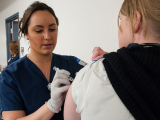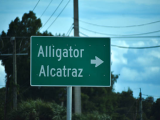A Food and Drug Administration (FDA) panel today voted to recommend the licensing of a Novartis adjuvanted seasonal flu vaccine for people age 65 or older, which if approved would be the nation's first boosted flu vaccine.
In its votes today, the FDA's Vaccines and Related Biological Products Advisory Committee (VRBPAC) recommended that the FDA consider the vaccine on an accelerated approval basis. Accelerated approved is granted for certain products that have been studied for safety and effectiveness, with the caveat that the company conduct further trials to characterize the clinical benefit.
The FDA used a similar pathway when it considered, then in 2009 approved, Sanofi's high-dose flu vaccine for seniors. A follow-up phase 3 study confirmed actual protection from the vaccine after earlier studies had shown significantly stronger immune response when compared with the standard-dose flu vaccine.
Possible US first
If the FDA accepts the VRBPAC recommendation, the Novartis vaccine would be the first adjuvanted seasonal flu vaccine to be used in the United States, though flu vaccines containing a booster have been widely used in Europe and other countries since they were first approved in Europe in 1997.
Adjuvants are added to increase immune response to a vaccine, and they are also used as part of a strategy to stretch limited supplies of antigen, such as for pandemic vaccines.
Currently, the only adjuvanted flu vaccine that has been licensed in the United States is a pandemic vaccine containing the ASO3 adjuvant, but as part of the pandemic vaccine stockpile it isn't available to the general public.
In the past, public health officials have aired some concerns about American acceptance of adjuvanted flu vaccines, given suspicions about additives such as the preservative thimerosal.
Vaccine makers, however, are still seeking ways to make more potent vaccine for seniors. Standard seasonal flu vaccines have very low effectiveness in seniors, whose immune systems are weaker than those of younger people.
The Novartis vaccine (Fluad) is an inactivated trivalent vaccine that contains the company's proprietary MF59 adjuvant, an oil-in-water emulsion that contains squalene, an oil found in some fish oils. In July, Australia-based CSL Limited completed its purchase of the Novartis flu vaccine division, now called NVS Influenza Vaccines.
H. Keipp Talbot, MD, MPH, an infectious disease specialist at Vanderbilt University in Nashville, said in an NVS Influenza Vaccines press release today, "There is a critical need for a seasonal flu vaccine that can help provide an enhanced immune response in the elderly population."
Panel voting
On the question of whether the immunogenicity data supported effectiveness under the accelerated approval process, the committee voted yes 11 to 1, with 1 abstention. On the question of safety in the age-group, the group voted yes by a 10-to-2 margin, with 1 abstention.
Sarah Petticord, a press officer with the FDA, said the advisory committee provides independent expert advice and a forum for the public to share its views, but the recommendations aren't binding. She added that the FDA will take VRBPAC's recommendations into consideration as it continues the application for the vaccine.
During today's hearing two members of the public spoke to the group, including a retired military medical officer who raised concerns about squalene in the MF59 adjuvant, rumored but never proven to be part of the anthrax vaccine given to military members. The other was Barbara Loe Fisher, president of the anti-vaccine organization National Vaccine Information Center, who urged the committee not to recommend that the vaccine be fast-tracked for seniors until the active ingredients are proved safe.
See also:
Sep 15 NVS Influenza Vaccines press release
CDC background on adjuvants
VRBPAC meeting materials





















